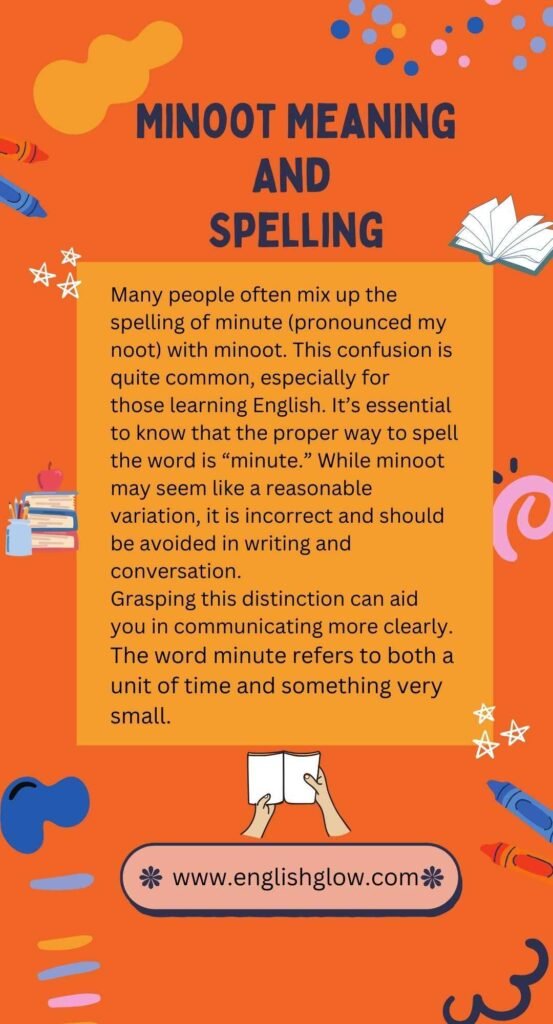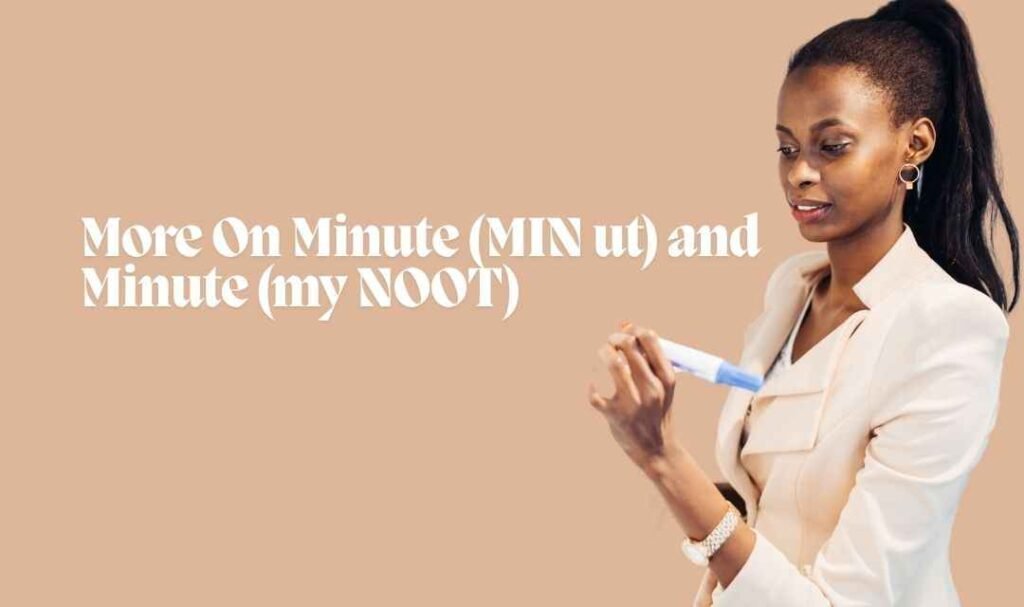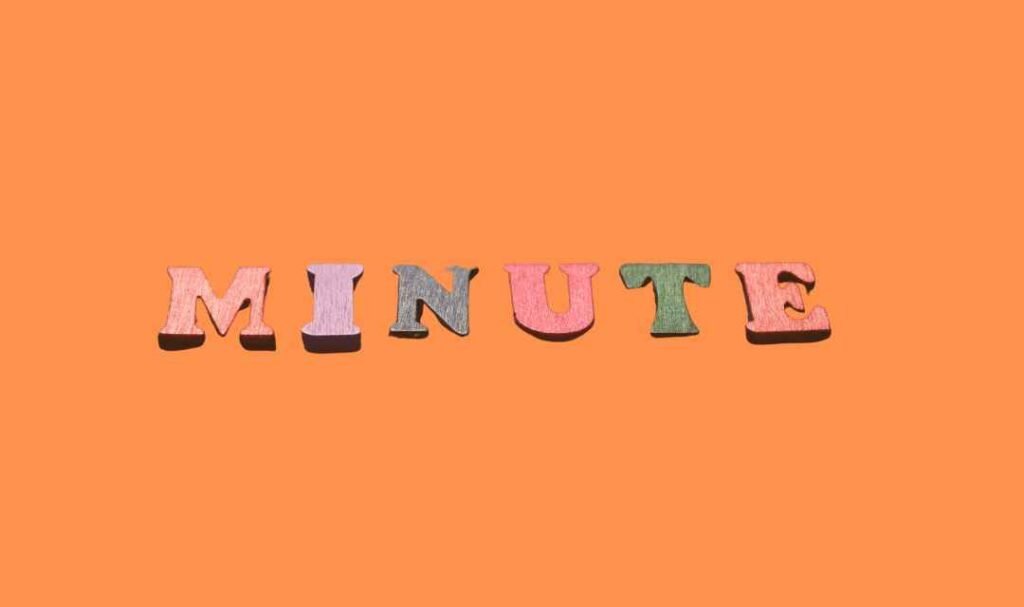The word minute can have different meanings, which often confuses people. One minute refers to a unit of time, equivalent to 60 seconds. It’s a straightforward way to measure time, like how long you wait for a bus. The other minute describes something very small or insignificant. For example, you might say, “I found a minute detail in the report.” Even though these two meanings are spelled identically, they are worlds apart in meaning.
Many people feel confused by these differences, but don’t worry; you’re not alone! This type of English trickery is referred to as a heteronym. Heteronyms are words that have the same spelling but different meanings and sometimes even different pronunciations. The word minute is a clear example of this, as it shows that English isn’t always straightforward.
When I first learned about these types of words, I found it fascinating yet challenging. Understanding the difference between minute (MIN-ut) and minute (my-NOOT) is essential. The first minute refers to a short period of time or a specific moment, while the second describes something very small or tiny.
In this article, I’ll help clear the air on the meanings of minute vs. minute with practical examples. I’ll also discuss why understanding these heteronyms is key for anyone looking to master the complicated language of English. By grasping these concepts, you can improve your communication and writing skills.
Minoot Meaning And Spelling
Many people often mix up the spelling of minute (pronounced my noot) with minoot. This confusion is quite common, especially for
those learning English. It’s essential to know that the proper way to spell the word is “minute.” While minoot may seem like a reasonable variation, it is incorrect and should be avoided in writing and conversation.
Grasping this distinction can aid you in communicating more clearly.
The word minute refers to both a unit of time and something very small. I remember when I first encountered this spelling issue; I mistakenly used minoot in a paper. My teacher pointed out the error, which helped me realize how important it is to pay attention to details in spelling.
By learning the correct spelling and meaning of minute, you can enhance your writing and avoid common mistakes. This small change in awareness can significantly improve your communication skills and confidence in using the English language.
you might enjoy reading: To Not or Not To? Solve This Grammar Mystery Now
More On Minute (MIN ut) and Minute (my NOOT)
The word minute can be a bit tricky because it has different meanings depending on how it’s used. The first meaning of minute (pronounced MIN ut) is a noun that refers to a unit of time.It refers to 60 seconds or one-sixtieth of an hour. This usage is straightforward and is commonly found in daily conversations. For example, you might say, “I’ll be there in five minutes,” to indicate a short wait. In another context, the plural form, minutes, can also refer to the written record of a meeting, capturing important points and decisions made.
On the other hand, we have minute pronounced as my NOOT. This version of the word is derived from the Latin word minutus, meaning small. It is often used as an adjective to describe something that is tiny or insignificant. For instance, you might say, “The details in the report are minute, but they matter.” Here, you emphasize that even the smallest details can be important.
These two forms are examples of heteronyms, which are words that are spelled the same but have different meanings and pronunciations. This can be a challenge for those learning the English language, as it can lead to confusion. For instance, someone might mistakenly use minute in a context that requires the other pronunciation. Understanding the distinctions between these two forms helps to avoid misuse and enhances effective communication.
It’s fascinating how language evolves and can sometimes confuse even native speakers. For example, a participant in a spelling bee might ask for an example of a heteronym in a sentence to clarify which word to spell. In this way, learning about words like minute can deepen our understanding of the English language and improve our literacy skills.
Recent Examples on the Web
Example for Minute (MIN ut)
- “I need to finish my homework in the next five minutes so I can watch my favorite show.”
Example for Minute (my NOOT)
- “The artist included minute details in the painting, making it extraordinarily lifelike.””
- These examples illustrate the different usages of “minute” in everyday contexts.
you might enjoy reading: Early This Month or Earlier This Month? Discover the Right Answer!
minute
The word minute has different meanings, and it’s important to know how to use it correctly. A minute (pronounced MIN ut) is a countable noun that represents one of the sixty parts an hour is divided into. For example, people often say, “I’ll be there in a minute” to indicate a short length of time. It’s interesting how we use minutes in everyday life. If you’re baking, you might say, “The pizza will take about twenty minutes to cook,” showing how we measure time in our daily routines.
In addition to being a measure of time, minute can also refer to written records from meetings. The plural noun, minutes, refers to the notes taken during a meeting that capture the important discussions and decisions. For instance, you might hear someone say, “He’d been reading the minutes of the last meeting.” This highlights how the word applies in different contexts
Another usage of minute is as a transitive verb. When someone minutes something at a meeting, they make a written record of what was discussed or decided.
For example
, “I need to minute the decisions made during our discussion.” This emphasizes the action of documenting important information.
Understanding the word minute can help clarify conversations, especially when discussing time. It’s essential to recognize how different meanings can lead to confusion. For example, when someone says, “I’ll be there in a minute,” they’re not just referring to sixty seconds but rather indicating a brief wait. This flexibility in language can be fun yet challenging, but with practice, you can master the different uses of minute.
What does “minut” (pronounced “my-noot”) mean? Is it spelled “minut” or “minute”?
When we talk about the word “minut” (pronounced “my-noot”), we’re referring to something that is very small or insignificant. This form of the word comes from the Latin adjective minutus, which means small or petty. For example, if you were discussing a project and mentioned, “The minute details are important,” you would be emphasizing that even the smallest points matter.
On the other hand, “minute” (pronounced “MIN-it”) has a different meaning. It is a noun that refers to a unit of time equal to 1/60th of an hour or 60 seconds. For instance, you might say, “I’ll finish this in just a few minutes,” showing how we use this form to measure time. This minute can also be used to measure angles, such as in geometry, where it represents 1/60th of a degree.
Both words are spelled the same but are pronounced differently and serve distinct grammatical functions. This difference can be confusing for many people, especially when learning English. Understanding that “minut” relates to something tiny or insignificant while “minute” refers to time or distance can help clarify communication.
In daily conversations, it’s common to hear these words used interchangeably, but they have specific meanings that should be respected. For example, if someone says, “The report was minute in detail,” they are highlighting how small details can have an impact, while saying, “It only took a few minutes to read,” refers to the actual time spent reading. Knowing these distinctions can improve your language skills and help you communicate more effectively.
Example
Here are separate examples for the two meanings of “minute” as discussed in the content:
Example for Minute (my NOOT)
“The minute details of the design were crucial to the project’s success.”
Example for Minute (MIN-it)
“The meeting lasted for forty minutes, and we covered a lot of important topics.”
These examples illustrate the different usages of “minute” in everyday contexts.
FAQ
What is the meaning of “minoot”?
The word “minoot” is most likely a misspelling or phonetic variation of “minute”. “Minute” refers to a unit of time, equal to 60 seconds, or something that is extremely small or detailed.
Which is correct: “minute” or “minuet”?
“Minute” is correct when referring to both time (60 seconds) and something tiny or precise.
“Minuet” refers to a type of slow, formal dance popular in the 17th and 18th centuries. These two words are not interchangeable.
Is “Mynute” and “minute” spelled the same?
No, “Mynute” is not a correct spelling. The proper spelling for both the unit of time and describing something small is “minute”.
How do you spell “minuit” in time?
The correct spelling for the unit of time is “minute”. The word “minuit” is French for “midnight” and is not used in English for time. In English, “minute” is the standard spelling.
Is it “minoot” or “minute”?
The correct spelling is “minute”. The word “minoot” is a phonetic misspelling of “minute.”
What is the difference between “minute” vs. “minute”?
“Minute” (noun) refers to a unit of time, equal to 60 seconds.
“Minute” (adjective) is used to describe something very small or detailed (pronounced as my-NOOT). Though spelled the same, they have different meanings and pronunciations.
How are the two meanings of “minute” used in sentences?
Time-related minute: I’ll be there in one minute.
Small or detailed minute: The artist paid attention to every minute detail in the painting.
How does “minute” compare to “minuet”?
“Minute” can refer to a unit of time or something small, whereas “minuet” is a type of slow, graceful dance from the 17th and 18th centuries.
What does “minoot” mean?
“Minoot” is not a correct word in English. It is likely a misspelling or phonetic attempt at “minute”, particularly the adjective meaning very small (pronounced as my-NOOT).
Should I use “minute” or “minuet” in my writing?
Use “minute” when referring to time (e.g., 60 seconds) or something small. Use “minuet” when referring to the elegant, classical dance.




